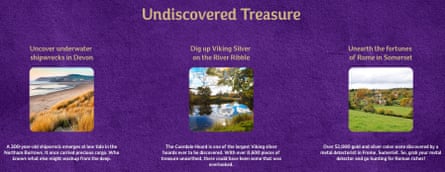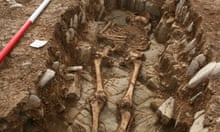Cadbury has temporarily pulled its “real treasure hunt” ad campaign after archaeologists and the government accused it of advocating looting.
The Treasure Island ads encouraged children to “grab your metal detector and go hunting for Roman riches”, but failed to warn that digging without permission is illegal. It suggested a number of sites across the UK and Ireland where “treasure’s fair game”.
The confectioner took the online ad site down on Monday after being inundated with messages from archaeologists who described the campaign as “irresponsible” – a view endorsed by the government. The arts minister, Michael Ellis, said the ad risked undermining rules to protect heritage.
I have been told that the irresponsible @CadburyUK #FreddoTreasures campaign has been taken down. While we want young people to explore our nation's history, there are obviously rules in place under the Treasure Act to protect finds. This campaign puts that at risk.
— Michael Ellis (@Michael_Ellis1) March 18, 2019
The Advertising Standards Authority said it had received about 30 complaints and was assessing whether to launch an investigation.
Cadbury said: “Cadbury Freddo Treasures aims to inspire families to go on everyday adventures together. It was not our intention to encourage anyone to break existing regulations regarding the discovery of new archaeological artefacts and we are grateful this matter has been brought to our attention.
“We can now confirm that the webpage has been taken down and we are updating the content to focus solely on directing families to museums where existing treasures can be found.”
The government’s heritage agency, Historic England, plans to write to Cadbury to complain about the ad. It said: “Unfortunately Cadbury’s PR campaign encouraging digging for treasure potentially puts people at odds with the law. There are strict rules that protect England’s archaeological heritage, including laws governing metal detection.
“We are glad to see the campaign website is no longer live and would be happy to advise Cadbury to make sure any future campaign doesn’t have unwelcome results.”
Some archaeologists want Cadbury to go further. Ian Trumble, a curator based at Bolton Museum, said the campaign threatened to undermine years of public heritage education.

“Cadbury has shown a gross misunderstanding of, and brazen disregard for, heritage assets in the UK and Ireland.”
Trumble said the campaign also showed a lack of due diligence as it had “striking similarities” to a Creme Egg promotion in the 80s, which was pulled after it encouraged digging and trespassing.
“Heritage bodies and institutions have spent decades trying to promote responsible engagement particularly with archaeological sites … a campaign like this will undoubtedly have a very damaging effect on the work that they strive to do,” he said.
“Cadbury should, at the very least, make a public retraction of the damaging and quite illegal promotions.”
This is quite possibly the most shocking, ill-advised & irresponsible ‘heritage engagement’ campaigns I have ever seen.
— Museum Ian (@trumerz) March 16, 2019
The #cadburytreasurehunt by @CadburyUK actively promotes the gleeful destruction of archaeological sites and undermines years of public heritage education... pic.twitter.com/YNQYsLszqH
The bioarchaeologist and writer Kristina Killgrove had also called for the website to be taken down.
TFW it’s 2019 and a chocolate company thinks it’s a good idea to promote their brand by encouraging illegal excavation and looting. What in the world was @CadburyUK thinking?!? Take this down NOW! 🤬🤯 #archaeology https://t.co/iCLuvGEggv pic.twitter.com/Djh6jCbQZ3
— Kristina Killgrove (@DrKillgrove) March 17, 2019
Aisling Tierney, an archaeologist based at Bristol University, accused Cadbury of “inciting children to become involved in illegal activities” and demanded it pay contribution to sites directly targeted to “demonstrate its contrition”.
In an article for British Archeology News Resource she added: “The whole campaign is in breach of the Advertising Standards Authority’s requirement for social responsibility whereby advertising materials should not condone or encourage unsafe, irresponsible or illegal acts.”
A spokesman for the Advertising Standards Authority said: “We will be assessing the concerns that have been raised and establishing whether or not we think there are grounds for an investigation.”
Helen Farr, a maritime archaeologist at the University of Southampton, said the campaign was inciting “theft of cultural heritage”.
@CadburyUK you’re advocating looting & theft of cultural heritage...erm. No, you cannot dig up protected sites. NorthamBurrows wreck is protected under the Ancient Monuments & Archaeological Areas Act 1979 @thehistoryguy @helenczerski @theAliceRoberts nb https://t.co/Q8fMzdnsBw
— Helen Farr (@RHelenFarr) March 17, 2019










